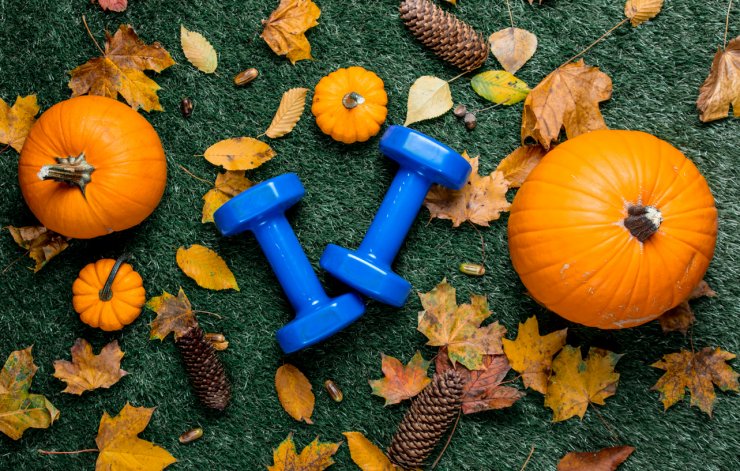
Pumpkins promote healthy living.
Pumpkins are good for so much more than jack-o’-lanterns and pumpkin pie. They’re sweet and packed with nutrients that can help reduce the risk of heart disease, lower your blood pressure, help prevent cancer, and promote a healthy digestive system.
Weight Loss
Pumpkin is loaded with fiber, which helps to slow the digestion process. The fiber in pumpkin helps keep you feeling fuller longer—and that can go a long way to stave off cravings. There’s more fiber in a cup of canned pumpkin than in two slices of whole-grain bread.
While pumpkin may be quite filling, it’s actually very low in calories. Canned pumpkin is nearly 90 percent water. So, not only do you get hydrated, you wind up adding just 50 calories to your meal.
Vision Health
That bright orange color in pumpkins comes from all the beta-carotene it’s carrying. The body converts it to vitamin A, which is essential for good eye health and helps your retinas absorb and process light.
Pumpkins are also packed with two other antioxidants—lutein and zeaxanthin—which researchers believe contribute to better eye health.
Immune System Protection
Who knew that your roasted pumpkin soup could help boost your immune system? The high level of vitamin A in pumpkins helps your body fight off infections. Pumpkin oil can even help ward off some bacterial and fungal infections. And all that vitamin C in pumpkins gives you that extra boost to help recover from colds faster.
Suppler Skin
Want to look and feel better, inside and out? Well, eating pumpkin will give you a good dose of beta-carotene, which is not only good for your vision but for your skin, too. Beta-carotene helps protect your skin from the sun’s UV rays that cause wrinkles.
Try a pumpkin mask for a great facial treatment that soothes and exfoliates. All you need is:
- 1/4 cup of pumpkin (remember—not pumpkin pie)
- 1 egg
- 1 tablespoon of honey
- 1 tablespoon of milk
Mix it all together, then slather it on. Relax for 20 minutes, then rinse with warm water. Ah, that’s better.
Cut Your Cancer Risk
We keep coming back to the beta-carotene in pumpkin; you know why? Because this antioxidant has an abundance of benefits. Not only is it good for your eyes and your skin—it’s also good at fighting cancer. Research has shown that people who eat a diet rich in beta-carotene may have a lower risk of some types of cancer, including prostate and lung cancer.
Vitamin A and vitamin C are on duty to protect your cells. Their antioxidant properties help fight cancer-causing free radicals—those damaged cells created by stress and inflammation.
Heart Health
Eating pumpkin can be good for your heart. The fiber, potassium, and vitamin C in pumpkin all contribute to a healthier heart. A diet higher in fiber can lower your risk of heart disease.
But don’t reach for the pumpkin pie. To add pumpkin to your diet in a healthy and tasty way, include pumpkin in your next medley of roasted vegetables. Sprinkle roasted pumpkin seeds on your salad, rice, or roasted veggies. You can even use pureed pumpkin to replace peanut butter or other spreads.
Muscle Builder
Pumpkins are a good source of potassium, which your body needs for proper muscle function. Pumpkin seeds are an especially strong source of amino acids that help build muscle, and magnesium, which helps your muscles relax after a long day tending your pumpkin patch.
Better Sleep
If you ever have trouble falling asleep, try a handful of pumpkin seeds. They’re rich in tryptophan—you know, that amino acid in turkey that everyone blames for their post-Thanksgiving food coma. Tryptophan also helps your body make serotonin—the neurotransmitter that helps you relax so you can get to sleep.
Better Mood
The magnesium in pumpkin seeds can give your mood a little boost. Research indicates that magnesium can significantly decrease symptoms of anxiety and depression. Half a cup of pumpkin seeds provides almost all of an adult’s recommended daily magnesium requirement.
You can use our recipe to roast pumpkin seeds yourself, or buy them at the store if your harvest is gone and it’s out of season; you may see them called pepitas. Just be sure you opt for the low-salt version.
Keep it Regular
A lot of people don’t get enough fiber in their diet, and that can lead to digestive issues. Just one cup of cooked pumpkin has about 3 grams of fiber. Most adults need 25 grams of fiber a day, so pumpkin is a good start.
High-fiber foods like pumpkin are linked to improved cholesterol and healthier blood sugar levels. Just take it easy on the pie.
Did you know that pumpkin can be so healthful? Please tell us about healthy ways you use pumpkin.


 Previous
Previous

